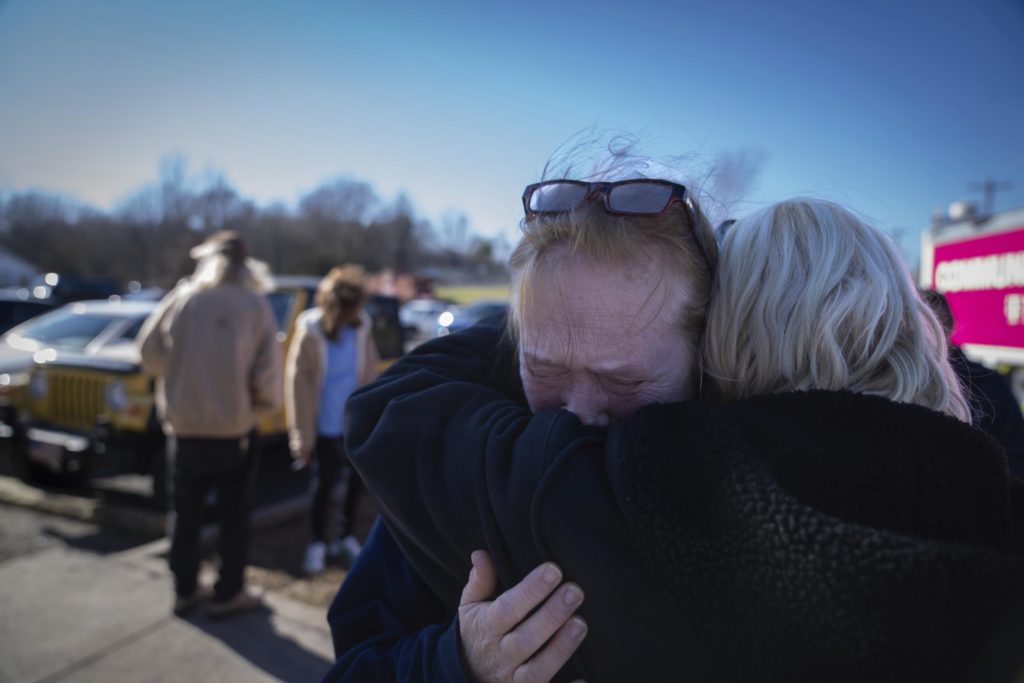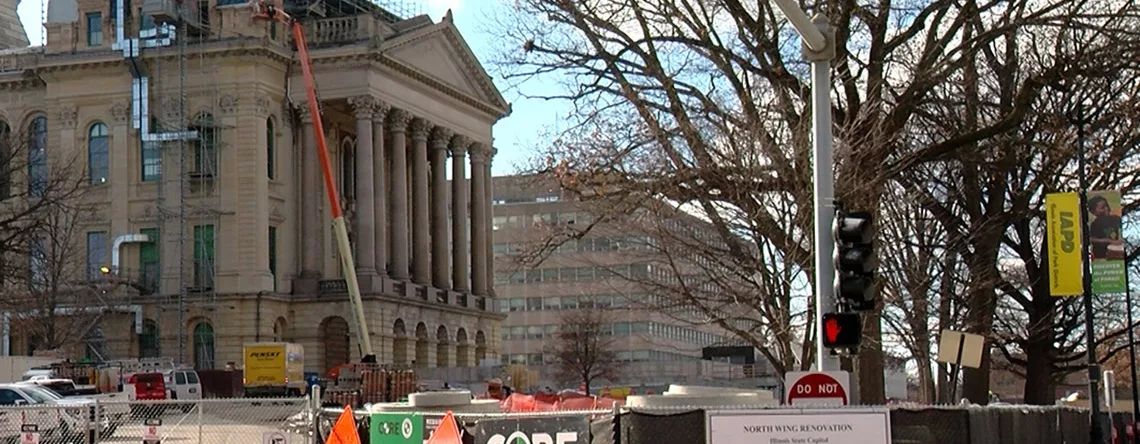
MAYFIELD, Ky. (AP) — The Mayfield Consumer Products factory was the third-biggest employer in this corner of western Kentucky, an important economic engine that churned out candles that lined the shelves of malls around the U.S.
But why its workers kept making candles Friday night as a tornado bore down on the region remains unclear as rescuers continue scouring the factory wreckage for signs of life.
Kentucky’s governor said Sunday the ferocity of the storm was so great that there was nowhere safe to hide inside the plant.
“It appears most were sheltering in the place they were told to shelter,” Gov. Andy Beshear said. “I hope that area was as safe as it could be, but this thing got hit directly by the strongest tornado we could have possibly imagined.”
A company spokesperson said Sunday that eight of the 110 workers on the overnight shift Friday are confirmed dead and another eight are missing. More than 90 have now been accounted for, making the death toll lower than some had feared hours earlier.
“Many of the employees were gathered in the tornado shelter and after the storm was over they left the plant and went to their homes,” said Bob Ferguson, the company spokesperson. “With the power out and no landline they were hard to reach initially.”
Satellite images provided by Maxar shows Mayfield Consumer Products candle factory and nearby buildings after a tornado caused heavy damage in the area, in Mayfield, Ky. (Satellite image ©2021 Maxar Technologies via AP)
Workers said they had been told to huddle in a central hallway area, the strongest part of the building, as the storm approached. Some had already left earlier in the night following a warning siren, they said.
The factory employs many people in and around Mayfield, a city of about 10,000 in Kentucky’s southwest corner. It is Graves County’s third-biggest employer, according to the county’s website. Even some inmates at the county jail have worked there.
Scented candles made in the plant eventually found their way onto the shelves of prominent retailers like Bath & Body Works. The Ohio retailer said in a statement it was “devastated by the horrible loss of life at the Mayfield Consumer Products factory – a long-standing partner of ours.”
The company’s founder, Mary Propes, in the mid-1990s “literally started this in her garage and it grew to one of the largest candle-makers,” Ferguson said.
And this was high season in Mayfield for turning out gift candles as Christmas approaches. Shortly before the disaster, the company had posted on Facebook that it was looking to hire more people for 10- to 12-hour shifts involving fast-paced work and mandatory overtime.
Most American candle-makers used to complete their holiday orders by early November, but labor shortages and other economic trends tied to the COVID-19 pandemic have extended crunch time well into December, said Kathy LaVanier, CEO of Ohio-based Renegade Candle Company and a board member at the National Candle Association.
LaVanier said candle-makers around the U.S. are horrified by what happened in Kentucky and are trying to find ways to help. Unlike many manufactured products, most candles sold in the U.S. are American-made, in part thanks to hefty and longstanding tariffs on Chinese-made candles.
“All of us in the candle business are reeling,” she said. “It could have been any of us.”
LaVanier said regular disaster drills are important at candle plants, especially to include temporary workers who might have just arrived to fill a demand surge. But the way they are built — rarely with basements, and structured to accommodate long manufacturing lines — makes it hard to avoid damage when a truly devastating storm hits.
“If we had enough advance notice and felt it was severe enough you might send people home,” she said.
Bryanna Travis, 19, and Jarred Holmes, 20, stood vigil near the rubble of the Mayfield candle factory Saturday where they had worked for months, usually for about $14.50 an hour. The engaged couple wasn’t working when the storm hit.
“I worked with these people. I talked to these people. I tried to build connections with these people. And I don’t know if one of my friends is gone,” Holmes said.
Holmes said there had been no drills during their time at the factory to prepare people in case of a storm.
“We haven’t had one since we’ve been there,” he said.
Ferguson, the company spokesperson, said drills were commonplace and workers followed the guidance when they found shelter.
“There were regular drills and the employees went to the shelter, which is an interior part of that building,” he said. “They were there long enough even for attendance to be taken.” But, he said, the “tornado was of such rare size and strength that” it had great destructive power.
The company said in a statement on its website that it had started an emergency fund to help employees and their families.
“We’re heartbroken about this, and our immediate efforts are to assist those affected by this terrible disaster,” CEO Troy Propes, the son of Mary Propes, said in the statement. “Our company is family-owned and our employees, some who have worked with us for many years, are cherished.”
Kentucky’s state safety and health agency website lists a series of 12 safety violations at the factory in 2019, though it doesn’t say what they were for. Ferguson said it had to do with a worker’s error involving a circuit breaker, which led to extensive safety trainings and a modest fine.
By DYLAN LOVAN and MATT O’BRIEN for the Associated Press
O’Brien reported from Providence, Rhode Island. AP writer Bruce Schreiner contributed to this report.








